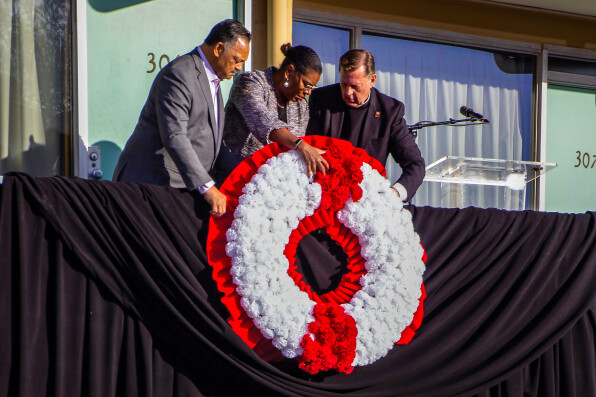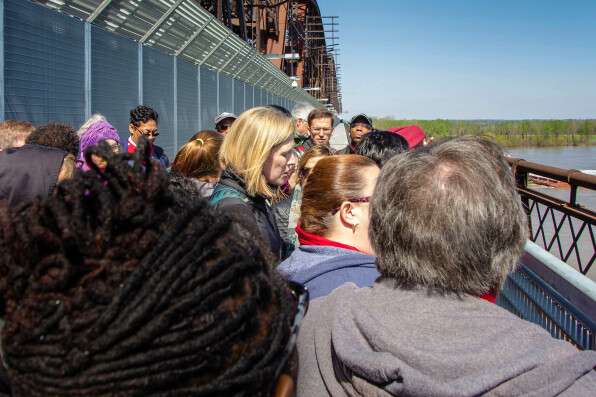Memphis sojourn commemorates King’s death
By Erik Alsgaard
UMConnection Staff

outside room 306 at the Lorraine Motel and National Civil Rights Museum in Memphis
April 4. Members of the BWC were present as part of a week-long sojourn to commemorate
the 50th anniversary of the assassination of the Rev. Martin Luther King Jr.
On April 4, 1968, an assassin’s bullet cut short the life of the Rev. Dr. Martin Luther King Jr. King was in Memphis, Tenn., when he was murdered, lending his voice and his cause to African Americans involved in a sanitation worker’s strike in that city.
Fifty years later, people around the world paused to remember and reflect on King’s tragic death. Among them were a group of clergy and laity from the Baltimore-Washington Conference who made a sojourn to Memphis the first week of April.
The creation of the Rev. Claire Matheny, the trip was designed to offer participants an opportunity to learn more about King’s life, racial justice, racism, and to see a little bit of Memphis on the side. Matheny serves as associate pastor at St. Paul’s UMC in Kensington.
A “double PK” (Pastor’s Kid), Matheny is a fourth-generation United Methodist who was born and raised in Memphis. She knew she wanted to attend the events surrounding the 50th anniversary of King’s death, but after being in Mississippi last summer after her grandmother’s death, she kept hearing the Holy Spirit saying, “Don’t go alone.”
“I didn’t have a great sense of what that meant,” Matheny said. “Certainly, it meant I could take a group from St. Paul’s, but I was getting the sense to draw the net wider.”
She shared that thought at last fall’s “Re-Call Summit,” and from there, the trip took off. The BWC helped support the planning and execution of the trip.
The Rev. Stacey Cole Wilson helped support the trip and became a participant herself. The Executive Minister of Justice and Service for the BWC, Cole Wilson said her parents were married the week King was killed. She has heard many stories from her parents about the climate of America during those days, she said.
“For me, it was an opportunity to understand the depth and gravity of what happened that week from a
One of the most powerful moments for Cole Wilson was when the group visited the Lorraine Motel and National Civil Rights Museum on April 4. At exactly 6:01 p.m., a bell tolled 39 times, one for each year of King’s life.
“The crowd was so noisy up to that moment,” Cole Wilson said. “But when the bells started, the entire crowd went silent. That moment was sad for me, incredibly sad. To just think about why he died. He was calling out the sin of racism, and he got killed for it. That was sobering.”
A hopeful moment for her was listening to Al Green sing one of King’s favorite hymns, “Precious Lord.”
“That’s when the life came back (to the crowd),” Cole Wilson said. “It was an infusion of hope.”

members on the recent sojourn to Memphis.
Matheny said she was inspired to create the trip as part of her response to the “Call to Action,” a pledge made by the 2016 Northeastern Jurisdictional Conference. That pledge was made after the conference unanimously approved a resolution that called for the church to do more to fight discrimination and to confront racism.
More than 30 people went on the journey, ranging in age from 20 to 72. It was important, Matheny said, that this trip
“My
“The future for us, as local churches (working for racial justice) is combining our efforts,” Matheny said. “We need to create space, to have conversation and repentance, and to educate one another.”
